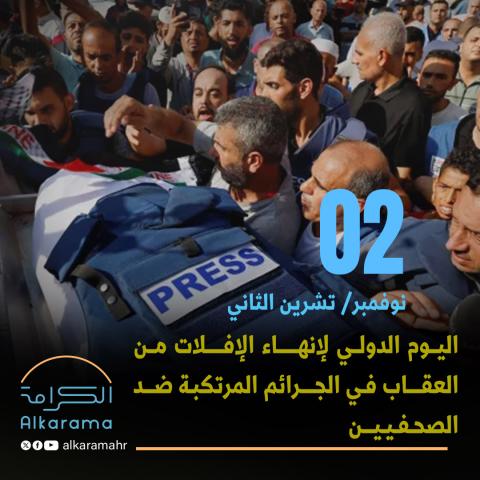
On the occasion of the International Day to End Impunity for Crimes Against Journalists, Alkarama renews its call to the international community to end the ongoing violations and persistent impunity suffered by media professionals. Alkarama warns of alarming global trends and of Gaza’s transformation into one of the deadliest places for journalists in modern history.
Alkarama recalls the message of the United Nations Secretary-General, who emphasized that the growing dangers faced by journalists — intimidation, judicial harassment, threats, and even assassinations — demand firm commitment to ending impunity and ensuring the protection of journalism, a cornerstone of democracy and the public’s right to information.
The Secretary-General urged States to respond to the increase in attacks, legal harassment, and digital threats against journalists. For its part, the Office of the United Nations High Commissioner for Human Rights (OHCHR) reiterated that journalists are civilians protected under all circumstances, and that attacks against them or their media outlets may constitute war crimes.
According to UNESCO’s alarming data, since 2006, 85% of journalist killings have gone unpunished. In 2024 alone, at least 68 journalists and media workers were killed in the line of duty, more than 60% of them in conflict zones — the highest figure in over a decade. These numbers highlight a deep gap between international commitments and the reality on the ground.
Gaza, A Damning Test of International Law
Since 7 October 2023, the Gaza Strip has become the most dangerous place in the world to practice journalism. On 6 June 2025, the OHCHR confirmed the deaths of 227 Palestinian journalists since the beginning of the conflict, reaffirming their status as civilians protected under international humanitarian law.
UN experts have repeatedly called for independent and credible investigations into these killings and attacks targeting journalists in Gaza, while denouncing censorship and repression policies. Recent estimates from journalistic and human rights sources suggest that the real toll is likely much higher.
This recurring pattern — killings during field reporting, strikes on homes and media offices, arbitrary arrests — constitutes serious violations that may amount to war crimes.
Press freedom organizations report that Palestinian journalists have been subjected to threats, violence, arbitrary detention, and torture. Restrictions imposed on foreign media have further increased the vulnerability of local teams, who are left to cover the conflict on their own.
The cumulative data clearly show that this is the deadliest conflict for journalists ever recorded, fully consistent with the severity of the documented facts.
Moreover, the use of famine as a weapon of war, which has affected journalists in Gaza just like the civilian population, constitutes a flagrant violation of international humanitarian law.
Legal and Human Rights Implications
The systematic and repeated violations — killings, deliberate targeting, detention, torture — when proven to be widespread or systematic, as in Israel’s conduct in Gaza, fall within the category of the most serious international crimes, entailing both individual criminal responsibility and state responsibility. Obstructing access to independent information further deepens human suffering and worsens the impact of the conflict.
International humanitarian law imposes strict obligations: journalists must be respected and protected as civilians. The United Nations repeatedly reaffirms this standard and condemns all violations of it. Impunity fuels recurrence: according to UNESCO, the absence of prosecutions in 85% of cases perpetuates violence against the media and undermines both freedom of expression and the right to information.
Therefore, Alkarama calls for the opening of independent and effective criminal investigations into all murders and attacks against journalists in Gaza and elsewhere, for full cooperation by States with UN mechanisms and for unhindered access by experts to sites of violations.
As for Arab governments, Alkarama urges them to adopt and implement national journalist protection plans, including early warning mechanisms, safety protocols during conflict, psychological support and safe refuge programs, in accordance with the UN Plan of Action on the Safety of Journalists and the Issue of Impunity.
To combat impunity, Alkarama advocates for strengthening both national and international jurisdictions, including the application of universal jurisdiction, so that perpetrators of grave crimes against journalists are held accountable. Alkarama also calls for an end to defamation and hate campaigns that precede or accompany assaults, and for the criminalization of threats, digital harassment and judicial harassment targeting media professionals.
Alkarama’s Advocacy
Alkarama continues to monitor numerous cases of violations committed against journalists across the Arab world.
In cooperation with UN mechanisms and special procedures, it works to strengthen accountability and prevention, particularly through monitoring systematic violations during conflicts, submitting international complaints and supporting victims and their families.
